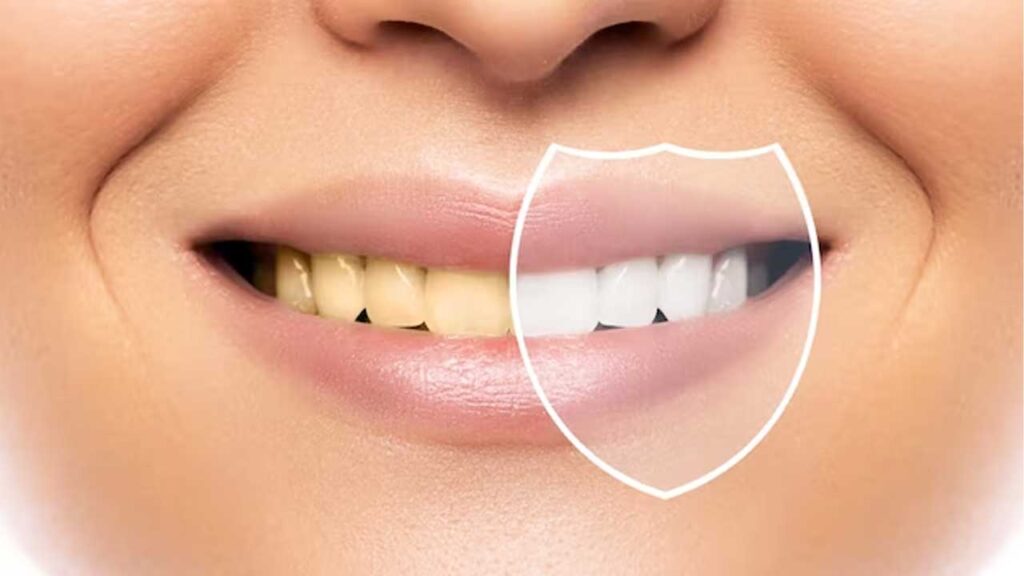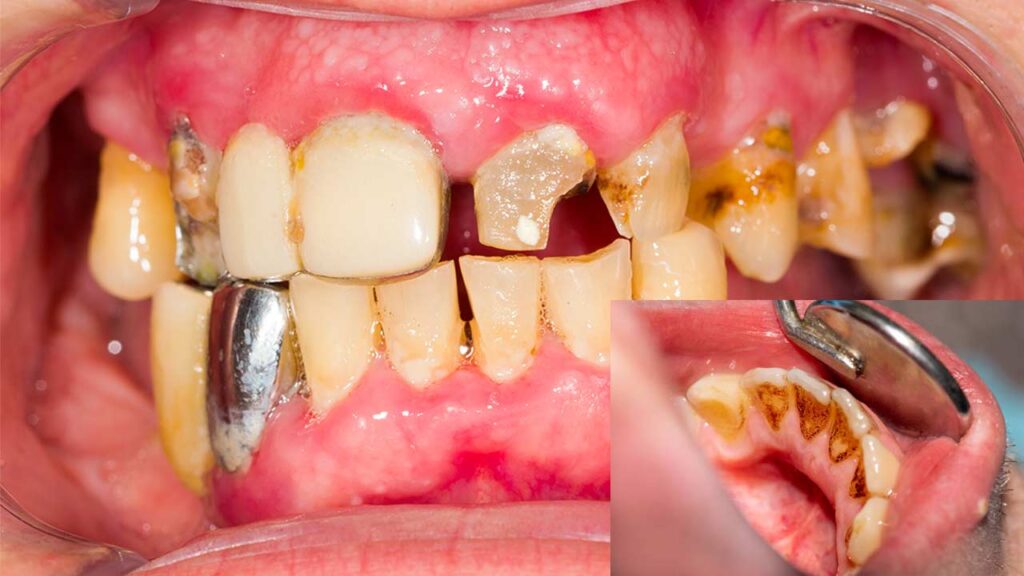Oral hygiene is the practice of keeping your mouth clean and free of diseases. It involves brushing your teeth, flossing, rinsing, and visiting your dentist regularly. Poor oral hygiene, on the other hand, is the neglect or failure of these practices, which can lead to various oral health problems, such as cavities, gum disease, bad breath, and tooth loss. Poor oral hygiene can also affect your overall health, as it can increase the risk of infections, inflammation, and chronic diseases.
In this article, you will learn:
- What are the causes and consequences of poor oral hygiene?
- What are the signs and symptoms of poor oral hygiene?
- How to improve your oral hygiene habits and prevent oral health problems?
- How to choose the best oral hygiene products and tools for your needs?
What are the causes and consequences of poor oral hygiene?

Poor oral hygiene is mainly caused by not brushing your teeth at least twice a day, not flossing daily, not rinsing with mouthwash, and not visiting your dentist at least twice a year. Other factors that can contribute to poor oral hygiene include:
- Eating sugary or acidic foods and drinks that can erode your tooth enamel and cause plaque and tartar buildup
- Smoking or chewing tobacco that can stain your teeth and damage your gums
- Drinking alcohol that can dry your mouth and reduce saliva production
- Taking certain medications that can affect your saliva flow or cause gum swelling
- Having certain medical conditions that can affect your oral health, such as diabetes, osteoporosis, HIV/AIDS, or cancer
Poor oral hygiene can have serious consequences for your oral health and overall health. Some of the common oral health problems caused by poor oral hygiene are:
Dental cavities:
These are holes in your teeth that are caused by bacteria that feed on the sugars in your food and produce acids that dissolve your tooth enamel. Dental cavities can cause toothache, sensitivity, infection, and tooth loss if left untreated.
Gum disease:
This is an infection of the tissues that support your teeth. It is caused by plaque and tartar that accumulate along your gum line and cause inflammation, bleeding, and receding gums. Gum disease can also cause bad breath, loose teeth, and tooth loss if left untreated.
Oral thrush:
This is a fungal infection of the mouth that is caused by an overgrowth of Candida albicans. It is more common in people with weak immune systems, diabetes, dentures, or dry mouth. Oral thrush can cause white patches on your tongue, cheeks, or throat, as well as burning sensation, difficulty swallowing, and altered taste.
Oral cancer:
This is a malignant growth of cells in any part of your mouth. It is more common in people who smoke, drink alcohol, have HPV infection, or have a family history of oral cancer. Oral cancer can cause sores, lumps, red or white patches, numbness, pain, bleeding, or difficulty chewing or speaking.
Poor oral hygiene can also affect your overall health by increasing the risk of:
Heart disease:
The bacteria from your mouth can enter your bloodstream and cause inflammation of your arteries, which can lead to atherosclerosis (hardening of the arteries), heart attack, or stroke.
Diabetes:
The inflammation from gum disease can impair your body’s ability to use insulin (a hormone that regulates blood sugar levels), which can worsen your diabetes or increase your risk of developing it.
Respiratory infections:
The bacteria from your mouth can travel to your lungs and cause pneumonia or other respiratory infections.
Pregnancy complications:
The bacteria from your mouth can cross the placenta and affect the development of your baby. This can increase the risk of premature birth (delivery before 37 weeks), low birth weight (less than 5.5 pounds), or preeclampsia (high blood pressure during pregnancy).
What are the signs and symptoms of poor oral hygiene
Poor oral hygiene may not always cause noticeable signs and symptoms until it leads to serious oral health problems. However, some of the early signs and symptoms of poor oral hygiene include:
Bad breath (halitosis):
This is an unpleasant odor from your mouth that may be caused by food particles stuck between your teeth, bacteria on your tongue or gums, dry mouth, smoking, or certain foods or drinks. Bad breath can affect your self-confidence and social interactions.
Yellow or brown stains on your teeth:
This is a discoloration of your tooth enamel that may be caused by plaque and tartar buildup, smoking, coffee, tea, wine, or other staining agents. Yellow or brown stains can affect your appearance and smile.
Bleeding or swollen gums:
This is a sign of inflammation or infection of your gums that may be caused by plaque and tartar buildup, brushing too hard, flossing too roughly, or gum disease. Bleeding or swollen gums can cause pain, sensitivity, and receding gums.
Toothache or sensitivity:
This is a pain or discomfort in your teeth that may be caused by tooth decay, cavities, cracks, exposed roots, or gum disease. Toothache or sensitivity can affect your eating, drinking, and sleeping habits.
Loose or missing teeth:
This is a result of damage or loss of your teeth that may be caused by tooth decay, cavities, gum disease, trauma, or extraction. Loose or missing teeth can affect your chewing, speaking, and facial structure.
If you notice any of these signs and symptoms of poor oral hygiene, you should visit your dentist as soon as possible for diagnosis and treatment. You should also improve your oral hygiene habits and prevent further oral health problems.
How to improve your oral hygiene habits and prevent oral health problems?
Improving your oral hygiene habits and preventing oral health problems is not difficult or expensive. It only requires some simple steps that you can follow every day. Here are some tips to help you improve your oral hygiene habits and prevent oral health problems:
- Brush your teeth at least twice a day for two minutes each time. Use a soft-bristled toothbrush and a fluoride toothpaste that can help strengthen your enamel and prevent cavities. Brush all the surfaces of your teeth, including the front, back, and chewing surfaces. Don’t forget to brush your tongue and gums as well.
- Floss your teeth at least once a day to remove plaque and food particles from between your teeth. Use a gentle up-and-down motion to slide the floss between your teeth without hurting your gums. You can also use an interdental brush, a water flosser, or a dental pick to clean between your teeth.
- Rinse your mouth with water after every meal or snack to wash away any food residue or bacteria from your teeth and gums. You can also use a mouthwash that contains fluoride and antimicrobial agents to prevent tooth decay and gum disease. However, avoid using mouthwash immediately after brushing your teeth as it can wash away the fluoride from your toothpaste.
- Visit your dentist at least twice a year for check-ups and cleaning. Your dentist can examine your mouth for any signs of oral health problems and provide treatment if needed. Your dentist can also clean your teeth professionally to remove any plaque and tartar that you may have missed with brushing and flossing.
- Eat a balanced and nutritious diet that supports your oral health. Avoid eating too much sugar or acidic foods and drinks that can damage your tooth enamel and cause plaque and tartar buildup. Instead, eat foods that are rich in calcium, phosphorus, vitamin C, vitamin D, and antioxidants that can help strengthen your teeth and gums and fight infections. Drink plenty of water to keep your mouth hydrated and stimulate saliva production.
- Quit smoking or chewing tobacco that can stain your teeth and damage your gums. Smoking or chewing tobacco can also increase the risk of oral cancer and other diseases. Seek help from your doctor or a support group if you need assistance to quit smoking or chewing tobacco.
- Limit alcohol consumption that can dry your mouth and reduce saliva production. Alcohol can also increase the risk of oral cancer and other diseases. Drink alcohol in moderation and drink water along with it to keep your mouth moist.
By following these tips regularly, you can improve your oral hygiene habits and prevent oral health problems. You can also enjoy the benefits of having a clean, healthy, and beautiful smile.
How to choose the best oral hygiene products and tools for your needs?
Choosing the best oral hygiene products and tools for your needs can help you improve your oral hygiene habits and prevent oral health problems. However, with so many options available in the market, how do you know which ones are right for you?
Here are some factors to consider when choosing oral hygiene products and tools for your needs:
Your oral health condition:
Depending on your oral health condition, you may need different types of products and tools to address your specific needs. For example, if you have sensitive teeth, you may need a toothpaste that contains potassium nitrate or strontium chloride that can help reduce the pain.
If you have gum disease, you may need a toothbrush that has soft or extra-soft bristles that can gently clean your gums. If you have braces, you may need a floss threader or an orthodontic brush that can help you clean between your wires and brackets.
Your personal preference:
Depending on your personal preference, you may like different types of products and tools that suit your taste and comfort. For example, if you like a fresh and minty flavor, you may prefer a mouthwash that contains menthol or eucalyptus.
If you like a smooth and creamy texture, you may prefer a gel toothpaste over a paste toothpaste. If you like a convenient and portable option, you may prefer a disposable toothbrush over a reusable toothbrush.
Your budget:
Depending on your budget, you may have to choose between different types of products and tools that vary in price and quality. For example, if you have a low budget, you may opt for a manual toothbrush over an electric toothbrush.
If you have a high budget, you may splurge on a sonic toothbrush over a regular electric toothbrush. However, remember that the most expensive product or tool is not necessarily the best one for you. You should always look for the ones that meet your oral health condition and personal preference.
To help you choose the best oral hygiene products and tools for your needs, you can also consult your dentist or hygienist for their professional advice and recommendations. They can assess your oral health condition and suggest the most suitable products and tools for you. They can also demonstrate how to use them properly and effectively.
Oral hygiene is the practice of keeping your mouth clean and free of diseases. Poor oral hygiene is the neglect or failure of these practices, which can lead to various oral health problems, such as cavities, gum disease, bad breath, and tooth loss. Poor oral hygiene can also affect your overall health, as it can increase the risk of infections, inflammation, and chronic diseases.
To prevent poor oral hygiene and its consequences, you need to improve your oral hygiene habits and choose the best oral hygiene products and tools for your needs. You need to brush your teeth at least twice a day for two minutes each time, floss your teeth at least once a day, rinse your mouth with water or mouthwash after every meal or snack, visit your dentist at least twice a year for check-ups and cleaning, eat a balanced and nutritious diet that supports your oral health, quit smoking or chewing tobacco, and limit alcohol consumption.
By following these steps regularly, you can improve your oral hygiene habits and prevent oral health problems. You can also enjoy the benefits of having a clean, healthy, and beautiful smile.


14 thoughts on “What is Poor Oral Hygiene?”